Kaist
Korean

College News
College of Engineering News
-
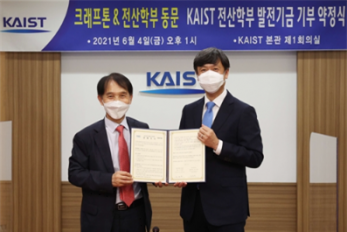
Krafton Matches Alumni Donations to Raise 11 Billi..
Alumni donations from the School of Computing, including Baemin and Devsisters, continue to grow < The Krafton matching grant ceremony was held on June 4 at KAIST campus. > Alumni from the KAIST School of Computing who are current and former developers at the leading game company Krafton, established by KAIST alumna Byung-Gyu Chang, made an agreement to help raise 11 billion KRW during a ceremony on June 4. The funds raised in the matching grant will be used to nurture software developers. Krafton Chairman Chang donated 10 billion won last January. His donation inspired other alumni working at Krafton as well as its former developers. Eleven KAIST alumni raised 5.5 billion KRW in two months and discussed the matching grant idea with Chairman Chang. The Krafton matching grant ceremony was attended by President Kwang Hyung Lee, Provost and Executive Vice President Seung Seob Lee, Vice President for Research Sang Yup Lee, Head of the School of Computing Sukyoung Ryu, Krafton Chairman Byung-gyu Chang, and KAIST alumnus from Krafton Seung-woo Shin. Other alumni donors including Krafton CEO Changhan Kim joined the ceremony online. Krafton CEO Changhan Kim said, “Just as our alma mater played an important role in growing our company, we hope that our donation could help support good developers. This will not only help our company, but advance our industry.” KAIST and Krafton also signed a business agreement to foster competitive developers. Krafton said it plans to continue giving back to society through the matching grant program. Head of the School of Computing Sukyoung Ryu thanked Chairman Chang and alumni who took part in the fund raising, saying, “To take the lead in rapidly changing computer technology, we desperately need more top students, faculty members, and facilities. We need more resources and infrastructure for interdisciplinary research.” The School of Computing has seen significant growth recently. Its number of undergraduate students has increased from 450 in 2016 to more than 900 in 2021. With this donation, the school will expand its current buildings to provide diverse educational and mentoring programs in more spacious facilities. Seung-woo Shin (Class of ’92), who joined Krafton’s matching grant, said, “I have always been thankful for the people I met and what I learned at KAIST. I was moved by the idea of giving back to the school.” Seong-jung Ryu (Class of ’97) said, “This donation reminded me of the good times I had back then. I thought it was crucial that the department’s facilities be extended, so I naturally wanted to take part.” Alumni donations, especially from the School of Computing, have also continued to grow more recently. Woowa Brothers Corp. CEO Beom-Jun Kim, the developer of the meal delivery app ‘Baemin’ donated 100 million KRW in April. Baemin became the most used app in the country during the COVID-19 pandemic. He explained, “I have been thinking about ways to give something to the next generation, rather than ‘paying back’ those who helped me in the past.” Encouraged by Baemin’s donation, alumni couple Ha-Yeon Seo and Dong-Hun Hahn from the School of Computing and eleven alumni engineers working at Devsisters Corp. also followed suit.
-
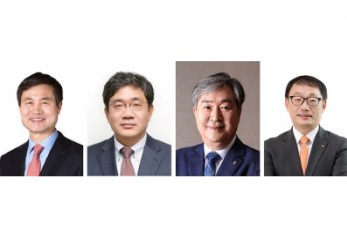
Distinguished Alumni Awardees 2020
The KAIST Alumni Association (KAA) announced the four recipients of the Distinguished Alumni Awards for the year 2020. The Distinguished Alumni Awards recognize graduates who have achieved outstanding accomplishments in their professional and personal lives, and who have been an inspiration to fellow alumni and students in Korea and around the globe. The four distinguished alumni of the year 2020 are listed below. President Dong-Won Kim (Department of Industrial and Systems Engineering, M.S., Class of ’82) of Jeonbuk National University is making significant contributions to the advancement of local industrial technology and the cultivation of professional personnel through outstanding research outcomes. As an educational administrator, his leadership is helping to realize long-desired projects at the university, through which he is strengthening the competitiveness of the university and the local community. Tae-Kyung Yoo (School of Electrical Engineering, M.S. and Ph.D., Class of ’83 and ’85 respectively), CEO and Chairman of Lumens, is a first-generation entrepreneur in the light emitting diode (LED) industry in Korea. He runs Lumens, a globally renowned company specializing in and leading the technological innovation of LEDs. He thereby contributes to strengthening national competitiveness and the advancement of science and technology. President Nak Kyu Lee (Department of Mechanical Engineering, M.S. and Ph.D., Class of ’85 and ’87 respectively) of the Korea Institute of Industrial Technology (KITECH) has shown excellent results in his research in which he developed core production technologies to lead the nation’s industries. He also focused on supporting on-site technologies involved in field work to apply what he developed into real production processes, and contributed greatly to improving the competitiveness of nationwide manufacturing. Hyeon-Mo Ku (School of Business and Technology Management, M.S. and Ph.D., Class of ’85 and ’93 respectively), CEO of KT Corporation, helped the nation’s leading communications company roll out the first 5G network in the world. He also strengthened national competitiveness in AI technology through ‘AI One Team,’ an industry-academic corporation project, and took the lead in developing the home-grown cloud industry. His involvement in the innovation of Korea’s ICT technology was highly recognized. Since the establishment of the award in 1992, a total of 107 alumni at home and abroad have brought distinction to the university and been honored as recipients. These recipients are playing major roles in society, and some of the notable former awardees include: KAIST President Sung-Chul Shin (2010), Samsung Electronics Vice Chairman Ki-Nam Kim (2012), Nexon Chairman Jung-Ju Kim (2007), and Krafton Chairman Byeong-Gyu Chang (2006). The President of the KAA and Advisor of Samsung Electronics, Chilhee Chung, said, “The Distinguished Alumni Awards are an honor given to alumni who have contributed to the development of the nation and society, and raised the name of their alma mater.” He added, “We can see the proud position of KAIST in the global arena just by looking at the accomplishments of our awardees.” (END)
-
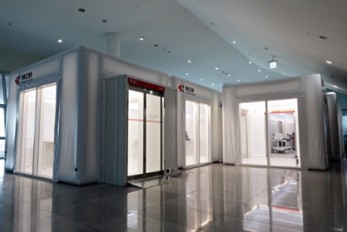
KAIST Mobile Clinic Module to Fill Negative Pressu..
Efficient versatile ready-for-rapid building system of MCM will serve as both a triage unit and bridge center in emergency medical situations < The view of ready-for-rapid-production negative pressure room called a Mobile Clinic Module (MCM) developed by KAIST. > A team from KAIST has developed a low-cost and ready-for-rapid-production negative pressure room called a Mobile Clinic Module (MCM). The MCM is expandable, moveable, and easy to store through a combination of negative pressure frames, air tents, and multi-function panels. The MCM expects to quickly meet the high demand for negative pressure beds in the nation and eventually many other countries where the third wave of COVID-19 is raging. The module is now ready to be rolled out after a three-week test period at the Korea Cancer Center Hospital. Professor Tek-Jin Nam’s team swung into action, rapidly working together with researchers, engineers with expertise in mechanical design, and a team of clinical doctors to complete the MCM as one of KAIST’s New Deal R&D initiatives launched last July. Professor Nam cites ‘expandability’ as the key feature of the MCM. Eventually, it will serve as both a triage unit and bridge center in emergency medical situations. “The module is a very efficient and versatile unit building system. It takes approximately two hours to build the basic MCM unit, which comprises four negative pressure bed rooms, nurse’s station, locker room, and treatment room. We believe this will significantly contribute to relieving the drastic need for negative pressure beds and provide a place for monitoring patients with moderate symptoms,” said Professor Nam. “It will also be helpful for managing less-severe patients who need to be monitored daily in quarantined rooms or as bridge stations where on-site medical staff can provide treatment and daily monitoring before hospitalization. These wards can be efficiently deployed either inside or outside existing hospitals.” The research team specially designed the negative pressure frame to ensure safety level A for the negative pressure room, which is made of a multi-function panel wall and roofed with an air tent. The multi-function panels can hold medical appliances such as ventilators, oxygen and bio-signal monitors. Positive air pressure devices supply fresh air from outside the tent. An air pump and controller maintain air beam pressure, while filtering exhausted air. An internal air information monitoring system efficiently controls room air pressure and purifies the air. While a conventional negative pressure bed is reported to cost approximately 3.5 billion KRW (50 billion won for a ward), this module is estimated to cost 0.75 billion won each (10 billion won for a ward), cutting the costs by approximately 80%. The MCM is designed to be easily transported and relocated due to its volume, weight, and maintainability. This module requires only one-fourth of the volume of existing wards and takes up approximately 40% of their weight. The unit can be transported in a 40-foot container truck. “We believe this will significantly contribute to relieving the drastic need for negative pressure beds and provide a place for monitoring patients with moderate symptoms. We look forward to the MCM upgrading epidemic management resources around the world.” Professor Nam’s team is also developing antiviral solutions and devices such as protective gear, sterilizers, and test kits under the KAIST New Deal R&D Initiative that was launched to promptly and proactively respond to the epidemic. More than 45 faculty members and researchers at KAIST are collaborating with industry and clinical hospitals to develop the antiviral technology that will improve preventive measures, diagnoses, and treatment.
-
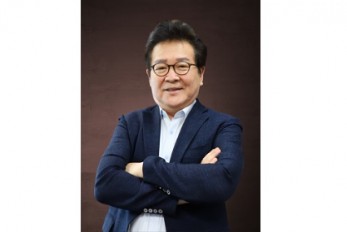
Professor Poong Hyun Seong Elected INSC Chair
< Professor Emeritus Poong Hyun Seong > Professor Emeritus Poong Hyun Seong from the Department of Nuclear and Quantum Engineering was elected as the Chairman of the International Nuclear Societies Council (INSC). His two-year term began on January 1. The INSC is an organization made up of nuclear societies all over the world, representing more than 80,000 nuclear professionals. The INSC founded in 1990 acts as a global forum to establish common goals of nuclear power usage, delivering the views and ideas of professionals throughout their regional societies. The INSC has advocated for nuclear power to be deemed an indispensable clean energy resources that can mitigate the climate change. The council has engaged in public awareness and publicity activities promoting the advantages of nuclear energy for developing next-generation power plants such as small nuclear reactors, local heating system, seawater desalination, and fair production of energy. Professor Seong is a globally renowned scholar in the fields of nuclear instrumentation control and human factor engineering. He retired last year after 30-year career at KAIST. He took on leadership roles in the Korea Nuclear Society and served as a member of the Korea Nuclear Safety and Security Commission as well as Atomic Energy Commission. A fellow at the America Nuclear Society, Professor Seong served as the first vice chair of the INSC and he received the Don Miller Award in 2019. The award established in 2009 by the American Nuclear Society in honor of former ANS President Don Miller is given to an individual who has made a significant contribution to the advancement of nuclear instrumentation and control of human-machine interfaces. He led the leadership role to help the Korean government steered into efficient and reasonable energy policymaking. More recently, as the Korean government decided to abandon nuclear energy, he actively opposed the government’s pivot. Professor Seong said, “Advanced countries like the US, UK, France, and Japan push forward the production of renewable energy by driving nuclear power plant under their pledges toward carbon neutrality by 2050. However, we are very concerned about the government’s policy shift to decrease the number of nuclear power plants while increasing the fossil fuel usage. I don’t think we can realize carbon neutrality by 2050 with the current policy.” (END)
-
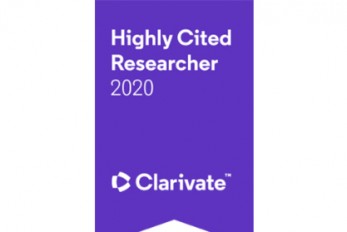
Three Professors Named to Highly Cited Researchers..
< Distinguished Professor Chang, Distinguished Professor Lee, and Professor Eom (from left) > Distinguished Professor Sukbok Chang from the Department of Chemistry, Distinguished Professor Sang-Yup Lee from the Department of Chemical & Biomolecular Engineering, and Professor Jiyong Eom from the College of Business were named to Clarivate’s Highly Cited Researchers 2020 list. Clarivate announced the researchers who rank in the top 1% of citations by field and publication year in the Web of Science citation index. A total of 6,167 researchers from more than 60 countries were listed this year and 37 Korean scholars made the list. The methodology that determines the “Who’s Who” of influential researchers draws on data and analyses performed by bibliometric experts and data scientists at the Institute for Scientific Information at Clarivate. It also uses the tallies to identify the countries and research institutions where these scientific elite are based. More than 6,000 researchers from 21 fields in the sciences, social sciences, and cross field categories were selected based on the number of highly cited papers they produced over an 11-year period from January 2009 to December 2019. Professor Chang made the list six years in a row, while Professor Lee made it for four consecutive years, and Professor Eom for the last two years. Professor Chang’s group (http://sbchang.kaist.ac.kr) investigates catalytic hydrocarbon functionalization. Professor Lee (http://mbel.kaist.ac.kr) is a pioneering scholar in the field of metabolic engineering, systems, and synthetic biology. Professor Eom’s (https://kaistceps.quv.kr) research extends to energy and environmental economics and management, energy big data, and green information systems.
-
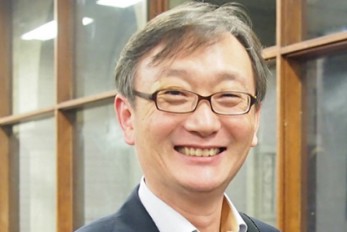
In Memory of Professor Dong-Soo Kim
Pioneering geotechnical engineer Dong-Soo Kim dies at 59 < The late Professor Dong-Soo Kim at the Department of Civil and Environmental Engineering. > The Department of Civil and Environmental Engineering lost a pioneering scholar in geotechnical engineering, Professor Dong-Soo Kim. Professor Kim died on November 3, after a one-and-a-half-year battle with a brain tumor. He was 59. Known for his piercing insight and infectious enthusiasm for the deepest questions in geotechnical science and engineering, Professor Kim built an extraordinary academic career while working at KAIST for 26 years. Professor Kim paved the way for establishing the geo-centrifuge experiment facilities at KAIST as part of the KOCED (Korea Construction Engineering Development Collaboratory Management Institute) Projects funded by the Ministry of Land, Infrastructure and Transport. He also served as director of the KOCED Geo-Centrifuge Center. “He made significant contributions to the growth of the department since his joining and he was at the forefront of the globalization of the department. He passed away so early leaving behind so many projects,” lamented Professor Emeritus Chung-Bang Yun. “Professor Kim insisted on lecturing despite his serious illness. He wanted to play his part so gracefully for his students until his last days,” said Professor Hyo-Gyong Kwak, the head of the department who was also a close colleague of 25 years. “His captivating warm smile and unwavering mentorship and guidance will be missed by students and faculty alike. We lost an exemplary leader, mentor, colleague, and friend.” One of his colleagues, Professor Gye-Chun Cho said, “We have lost a great professor and colleague in civil engineering worldwide. His impact and legacy will be remembered forever.” Joining the KAIST faculty in 1994, he began his academic career at the Polytechnique University, New York for three years after earning his PhD at the University of Texas at Austin in 1991. He finished his BS and MS at Seoul National University in 1983 and 1985 respectively. While at KAIST, he led the Soil Dynamics Lab in 1994 and researched on site characterization via field and lab tests. He also conducted geotechnical centrifuge tests on earthquake and offshore geotechnical problems. His research team studied the seismic design of geotechnical structures and explored the non-destructive testing and evaluation of civil structures. Professor Kim made profound contributions to understanding fundamental geotechnical engineering problems. More recently, his lab investigated physical modeling using the geo-centrifuge testing machine that could simulate field geotechnical problems on small-scale models. Professor Kim’s perseverance, deep curiosity, and enthusiasm for discovery served him well in his roles as a teacher, mentor, and colleague in the department and beyond. “I thought of him as an elder brother who fully understand everything with generous mind,” said Professor Haeng-Ki Lee, former head of the department. “I will never forget the hiking trip to Halla Mountain in Jeju last summer. He continuously cheered on the junior professors. Without him, we could not have made it to the summit. His support and encouragement always led us to produce good results and achievement in the labs,” remembered Professor Youngchul Kim. Taking great delight in helping young scientists, he inspired colleagues and students to find their own eureka moments. To professors like Jong-In Han and Ayoung Kim, he was the role model they hope to be due to his rigorous scholarship and generous character. Upon his passing, Professor Jaewook Myung reviewed all the emails he and Professor Kim has sent starting from his undergraduate days at KAIST. “He was my guiding light. He always listened attentively to my struggles from my undergraduate days and advised me very warmly.” Professor Kim was also known for his key role in the Korean Geotechnical Society. His unmatched leadership led him to serve as the Chair of the Organizing Committee for the 19th International Conference on Soil Mechanics and Geotechnical Engineering in Seoul in 2017. He was the General Secretary of the 5th International Symposium on Deformation Characteristics of Geomaterials. He also served as a chair of the ISSSMGE TC 104 committee. Professor Kim successfully carried out numerous projects with his research team and supervised more than 60 graduate students. For current students under his supervision, it is still tough to acknowledge the loss of their professor. Master candidate Yeonjun Kim feels lost moving forward. PhD candidate Junsik Bae said that it is like a bad dream and he feels Professor Kim will still be in his lab whenever he goes inside. One of the staff members who worked with him, Byeol-Nim Cha, remembered that Professor Kim always entered the office with a big smile. “He always asked me how I am doing,” Cha added. Professor Kim’s trailblazing research was recognized with several awards and honors. Cited as a Top 100 Scientist by the International Biographical Center (IBC) in 2008, Professor Kim received the Young Presidential Research Award from the Korean Academy of Science and Technology in 2002, the Korean Presidential Award on Civil Engineer’s Day in 2011, and the Telford Premium Rewards in 2018. Throughout his career, he authored or co-authored 321 papers in international journals and conference proceedings, and 278 papers in domestic journals and conferences. President of the Korean Geotechnical Society Choong-gi Chung also eulogized him, “Above his impressive professional contributions, Professor Kim will be remembered forever for his generosity, simplicity, playfulness, and his smile.” Professor Kim is survived by his wife, son, and daughter.
-
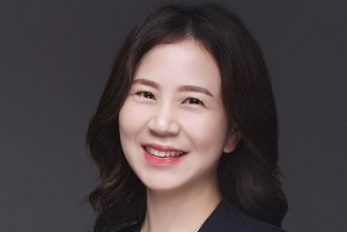
Professor Alice Oh to Join GPAI Expert Group
< Professor Alice Haeyun Oh > Professor Alice Haeyun Oh will participate in the Global Partnership on Artificial Intelligence (GPAI), an international and multi-stakeholder initiative hosted by the OECD to guide the responsible development and use of AI. In collaboration with partners and international organizations, GPAI will bring together leading experts from industry, civil society, government, and academia. The Korean Ministry of Science and ICT (MSIT) officially announced that South Korea will take part in GPAI as one of the 15 founding members that include Canada, France, Japan, and the United States. Professor Oh has been appointed as a new member of the Responsible AI Committee, one of the four committees that GPAI established along with the Data Governance Committee, Future of Work Committee, and Innovation and Commercialization Committee.
-
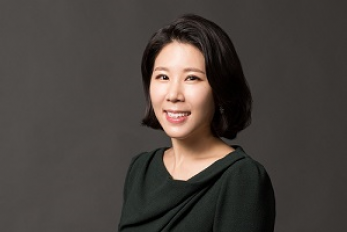
Research on the Million Follower Fallacy Receives ..
< Professor Meeyoung Cha > Professor Meeyoung Cha’s research investigating the correlation between the number of followers on social media and its influence was re-highlighted after 10 years of publication of the paper. Saying that her research is still as relevant today as the day it was published 10 years ago, the Association for the Advancement of Artificial Intelligence (AAAI) presented Professor Cha from the School of Computing with the Test of Time Award during the 14th International Conference on Web and Social Media (ICWSM) held online June 8 through 11. In her 2010 paper titled ‘Measuring User Influence in Twitter: The Million Follower Fallacy,’ Professor Cha proved that number of followers does not match the influential power. She investigated the data including 54,981,152 user accounts, 1,963,263,821 social links, and 1,755,925,520 Tweets, collected with 50 servers. The research compares and illustrates the limitations of various methods used to measure the influence a user has on a social networking platform. These results provided new insights and interpretations to the influencer selection algorithm used to maximize the advertizing impact on big social networking platforms. The research also looked at how long an influential user was active for, and whether the user could freely cross the borders between fields and be influential on different topics as well. By analyzing cases of who becomes an influencer when new events occur, it was shown that a person could quickly become an influencer using several key tactics, unlike what was previously claimed by the ‘accidental influential theory’. Professor Cha explained, “At the time, data from social networking platforms did not receive much attention in computer science, but I remember those all-nighters I pulled to work on this project, fascinated by the fact that internet data could be used to solve difficult social science problems. I feel so grateful that my research has been endeared for such a long time.” Professor Cha received both her undergraduate and graduate degrees from KAIST, and conducted this research during her postdoctoral course at the Max Planck Institute in Germany. She now also serves as a chief investigator of a data science group at the Institute for Basic Science (IBS).
-
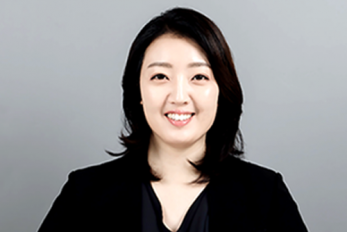
Professor Sue-Hyun Lee Listed Among WEF 2020 Young..
< Professor Sue-Hyun Lee > Professor Sue-Hyun Lee from the Department of Bio and Brain Engineering joined the World Economic Forum (WEF)’s Young Scientists Community on May 26. The class of 2020 comprises 25 leading researchers from 14 countries across the world who are at the forefront of scientific problem-solving and social change. Professor Lee was the only Korean on this year’s roster. The WEF created the Young Scientists Community in 2008 to engage leaders from the public and private sectors with science and the role it plays in society. The WEF selects rising-star academics, 40 and under, from various fields every year, and helps them become stronger ambassadors for science, especially in tackling pressing global challenges including cybersecurity, climate change, poverty, and pandemics. Professor Lee is researching how memories are encoded, recalled, and updated, and how emotional processes affect human memory, in order to ultimately direct the development of therapeutic methods to treat mental disorders. She has made significant contributions to resolving ongoing debates over the maintenance and changes of memory traces in the brain. In recognition of her research excellence, leadership, and commitment to serving society, the President and the Dean of the College of Engineering at KAIST nominated Professor Lee to the WEF’s Class of 2020 Young Scientists Selection Committee. The Committee also acknowledged Professor Lee’s achievements and potential for expanding the boundaries of knowledge and practical applications of science, and accepted her into the Community. During her three-year membership in the Community, Professor Lee will be committed to participating in WEF-initiated activities and events related to promising therapeutic interventions for mental disorders and future directions of artificial intelligence. Seven of this year’s WEF Young Scientists are from Asia, including Professor Lee, while eight are based in Europe. Six study in the Americas, two work in South Africa, and the remaining two in the Middle East. Fourteen, more than half, of the newly announced 25 Young Scientists are women. (END)
-
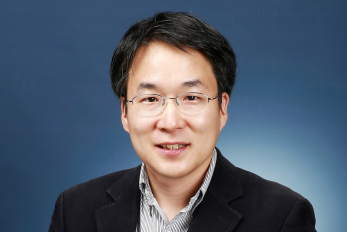
Professor Dongsu Han Named Program Chair for ACM C..
< Professor Dongsu Han > Professor Dongsu Han from the School of Electrical Engineering has been appointed as the program chair for the 16th Association for Computing Machinery’s International Conference on emerging Networking EXperiments and Technologies (ACM CoNEXT 2020). Professor Han is the first program chair to be appointed from an Asian institution. ACM CoNEXT is hosted by ACM SIGCOMM, ACM's Special Interest Group on Data Communications, which specializes in the field of communication and computer networks. Professor Han will serve as program co-chair along with Professor Anja Feldmann from the Max Planck Institute for Informatics. Together, they have appointed 40 world-leading researchers as program committee members for this conference, including Professor Song Min Kim from KAIST School of Electrical Engineering. Paper submissions for the conference can be made by the end of June, and the event itself is to take place from the 1st to 4th of December. Conference Website: https://conferences2.sigcomm.org/co-next/2020/#!/home (END)
-

Professor Youngchul Kim Joins Presidential Commiss..
< Professor Youngchul Kim > Professor Youngchul Kim from the Department of Civil and Environmental Engineering, who is also the Director of the Smart City Research Center at KAIST, was appointed as a commissioner of the 6th Presidential Commission on Architecture Policy on May 19. Professor Kim will contribute to coordinating and deliberating national architecture and urban development policies. He will serve a two-year term beginning this month. The Presidential Commission on Architecture Policy is made up of 30 commissioners. Nineteen members, including Professor Kim, are experts from the private sector, and the rest include the Minister of Land, Infrastructure, and Transport, the Minister for Environment, and other government officials. The non-governmental commissioners represent a diverse mixture of genders, ages, and regions for the balanced development of the nation. (END)
-
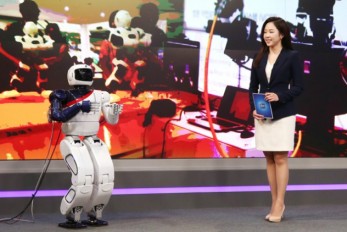
Hubo Debuts as a News Anchor
< HUBO anchored the evening news on a local TA station TJB on May 14. > HUBO, a humanoid robot developed by Professor Jun-Ho Oh’s team, made its debut as a co-anchor during the TJB prime time news 8 on May 14. “Un-contact" became the new normal after Covid-19 and many business solutions are being transformed using robotics. HUBO made two news reports on contactless services using robots in medical, manufacturing, and logistics industries. HUBO 2, the second generation of HUBO, appeared as a special anchor on the local broadcasting network’s special program in celebration of its 25th anniversary. HUBO is the champion of the 2016 DARPA Robotics Challenge held in the USA. Its FX-2 riding robot also participated in the Olympic torch relay during the 2018 PyeongChang Winter Olympics.

